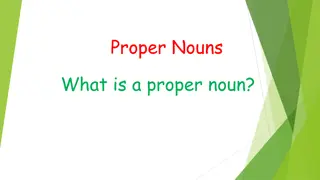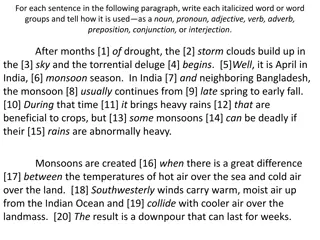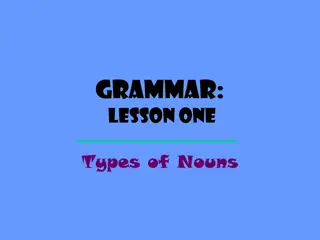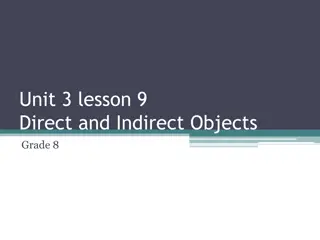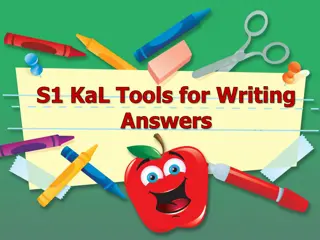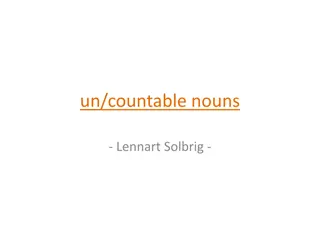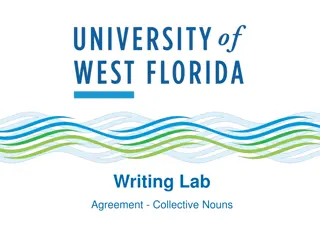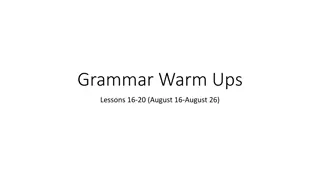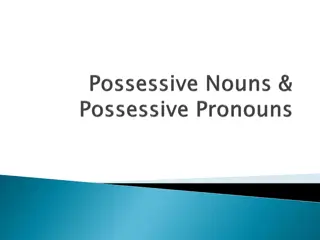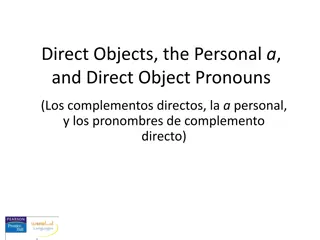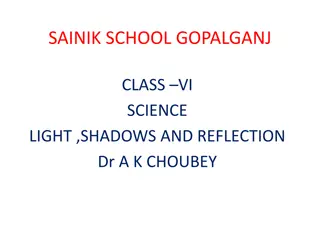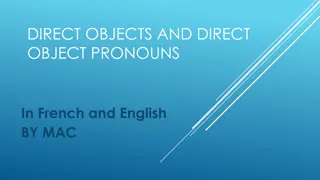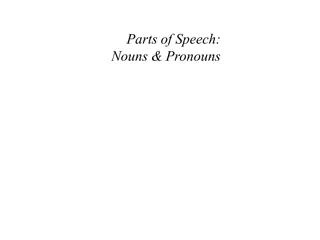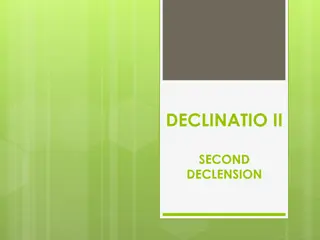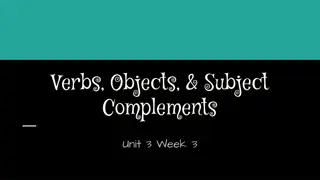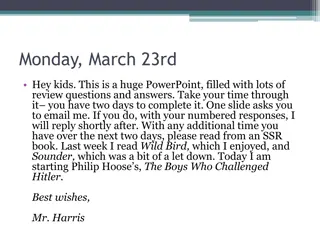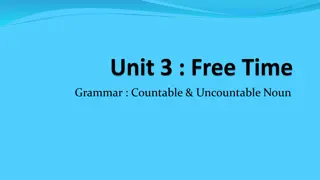Understanding Nouns, Subjects, and Direct Objects in Grammar
Nouns are versatile parts of speech that can function in various ways, including as subjects and direct objects in sentences. Subjects usually perform actions, while direct objects receive the action of the verb. This content explores the roles of nouns, subjects, and direct objects in sentences with clear examples and explanations.
Download Presentation

Please find below an Image/Link to download the presentation.
The content on the website is provided AS IS for your information and personal use only. It may not be sold, licensed, or shared on other websites without obtaining consent from the author. Download presentation by click this link. If you encounter any issues during the download, it is possible that the publisher has removed the file from their server.
E N D
Presentation Transcript
Nouns A NOUN is a part of speech. It can FUNCTION in 8 different ways. (PRONOUNS stand in the place of nouns & can function any way a noun can.)
Subject 1. The subject USUALLY does the action: a. John ran away from the monster b. Five days a week my mother dusts. c. Nearing the yellow light, the driver sped up. d. It s not fair! shouted John. Note that occasionally, as in d., the subject can follow the verb. Sometimes the subject receives the action. That s what s called a passive voice sentence. There will always be a form of to be (is,are,was,were,be) & a past participle (jumped, laughed, eaten, spoken, sung, frozen, etc.) a. The song was sung a capella. b. The book was written in 1988. c. John was hit in the head. Subjects can be compound. Compound subjects take plural verbs. a. John and Mark play baseball for the Ridgeland Titans. b. Math, science, and English are my best subjects.
Practice Which of the answer choices is the subject of the following sentence? Because of his muscular definition, the bodybuilder won the title of Mr. Universe. a. Definition b. Bodybuilder c. Title d. Mr. Universe
B. bodybuilder Prepositional Phrase with definition being the object of the preposition (noun) (Because of his muscular definition,) the bodybuilder won the title (of Mr. Universe.) article subject verb article Direct prepositional phrase: of = preposition (noun) (action) Object (noun) Mr. Universe (noun) = object of the preposition
Practice Which noun is the subject in the following sentence? Ridiculous! shouted Sarah in a frustrated tone. a. Ridiculous b. Sarah c. Frustrated d. tone
b. Sarah Ridiculous! shouted Sarah (in a frustrated tone.) adjective subject action verb noun prepositional phrase in = preposition a = article (non-descriptive adjective) frustrated = adjective describing what kind of tone tone = object of the preposition (noun) Ridiculous! = adjective/exclamatory remark in this example
2. Direct Object A direct object follows the verb & receives its action. It answers the question what or whom in reference to the verb: John threw the ball. (Threw what?) Tomorrow morning Elisa will meet your sister and brother. (Meet whom?) (notice this is a compound DO) We helped him with his homework. (Helped whom?) He doesn t understand anything about that complex story. (Understand what? Anything is a pronoun.) While hiking, Alicia found a silver bracelet. a. b. c. d. e.
Practice What is the direct object in the following sentence? Jason and Paige have been playing the music of The Band Perry. a. Jason b. Paige c. Music d. The Band Perry
c. music Jason and Paige have been playing the music (of The Band Perry.) Jason, Paige Compound subject verb phrase and = conjunction have been = helping verbs playing = main verb (action) prepositional phrase of = preposition The Band Perry = OP (proper have been playing what? music = DO noun)
Practice What is the direct object in the following sentence? Rachel and her sister Anna enjoy soccer and basketball. a. Rachel b. Sister c. Anna d. Enjoy e. soccer f. basketball
e. soccer f. basketball Rachel and her sister Anna enjoy soccer and basketball. subject conj. Poss. Subject appositive action verb pronoun conj. enjoy what? (direct object) enjoy SOCCER and BASKETBALL = compound DO
3. Indirect Object The indirect object follows the verb & answers to whom or for whom in reference to the verb. (It can also be to/for what, but it s usually to/for whom.) The indirect object is frequently a pronoun. *You must have a DO to have an IO. John gave me the money. (to whom?) Elisa sent John a letter. (to whom?) Addison bought Alex a car. (for whom?) a. b. c. d. Momma made Kerry and me our favorite dessert. (for whom?) notice that the IO is compound
Practice What is the indirect object in the following sentence? Dad fixed Jason some spaghetti for dinner. a. Dad b. Jason c. some d. Spaghetti e. dinner
b. Jason how much spaghetti? Dad fixed Jason some spaghetti (for dinner.) Subject verb Indirect adjective object direct object preposition object of prep (noun) action verb made what? spaghetti= do Dad (noun) Is the doer of the action/subject of the sentence. Made spaghetti for whom? Jason = indirect object for is the preposition dinner is the noun that ends this prepositional phrase
Practice What is the indirect object in the following sentence? Charlie handed Annie and me the report on Abe Lincoln. a. Charlie b. Annie c. Me d. Report e. Abe Lincoln
b. Annie c. me Charlie handed Annie and me the report (on Abe Lincoln.) subject action verb direct object prepositional phrase Ask yourself, Charlie handed what? REPORT = direct object Then ask, Charlie handed the report (DO) to whom? Annie and me (IO) Remember that you MUST have a direct object in order to have an indirect object, so always look for the DO. Also, remember that you can have a DO and not have an IO, but you CAN T have an IO if you do not have a DO.
4. Predicate Nominative (Predicate Noun) A predicate nominative follows the verb and renames the subject. Predicate nominatives can also be referred to as the subject complement. Predicate nominatives follow LINKING VERBS (verbs of being am, is, are, was, were, has been, have been, had been, will be, shall be, may be, might be, can be, should be, would have been; other common linking verbs appear, become, feel, grow, look, remain, seem, smell, sound, stay, taste, turn [depending on their use in the sentence]) John is a student. A Christmas Carol remains my favorite book. Elisa became a lawyer. Addison will be an excellent surgeon. Emory might be a private university. a. b. c. d. e.
Practice Which of the following sentences does not have a linking verb? a. He became an honor student at Olde Towne Midle School. b. Josh Johnson was a famous track star in the 1960s. c. Johnson started his track career at Baylor University. d. Roasted peanuts smell wonderful.
c. Johnson started his track career at Baylor University. a. He became an honor student at Olde Towne Middle School. b. Josh Johnson was a famous track star in the 1960s. c. Johnson started his track career at Baylor University. d. Roasted peanuts smell wonderful. Here is a useful trick if you are not sure if the verb action or liking: exchange the verb for a basic verb of being (is/are, was/were). If the meaning of the sentence has not changed, the verb is linking. a. He was an honor student (linking) b. Josh Johnson was (linking) c. Johnson was his track career (THIS DOES NOT MAKE SENSE) Action d. Roasted peanuts are wonderful. (linking)
Practice What is the predicate nominative in the following sentence? Peanut butter was the ingenious invention of a St. Louis doctor in 1890. a. Peanut butter b. Invention c. St. Louis d. doctor
b. invention Peanut butter was the ingenious invention (of a St. Louis doctor) (in 1890). Adjective Prep. phrase prepositional phrase subject linking verb predicate nominative Peanut butter = invention
You Must Know Your Prepositions Copy the list of Commonly Used Prepositions and Some Compound Prepositions from p. 109 in your Language text. Prepositions begin phrases, and the noun (or pronoun) at the end of the phrase is called the object of the preposition. (According to my English teacher), I must memorize prepositions. Prepositional phrase direct object subject/pronoun compound preposition verb phrase object of the preposition/noun I must memorize what? (DO)
Practice Which of the following sentences DOES NOT have a prepositional phrase? a. Before it rains, put your bike in the garage. b. Turn down the stereo right now! c. Karen, bring the newspaper in. d. Will you read a novel by Ellen Raskin?
c. Karen, being the newspaper in. a. Before it rains, put your bike (in the garage). b. Turn left (on Maple Street) to get (to my house.) c. Karen, bring the newspaper in. d. Will you read a novel (by Ellen Raskin)? In does not begin a phrase in this sentence. In this sentence, the word in is an adverb telling where.
Object of a Preposition 5. Prepositions are words that link the rest of the sentence to their object. English is full of them: of, near, after, before, from, to, through, under, over, across, with to name a few. A preposition has to have an object, and the object is a noun or pronoun at the end of the prepositional phrase. He left after class. I work with your friend. My best friend lives across the street. Over the river and through the woods to Grandmother s house we go. a. b. c. d.
Practice What is the object of the preposition in the following sentence? The buried treasure is beneath the ancient Indian mound. a. Treasure b. Ancient c. Indian d. mound
d. Mound The buried treasure is (beneath the ancient Indian mound.) subject /noun linking verb preposition object of the preposition/noun
6. Appositive An appositive follows a noun and renames it. a. My sister Rita lives in Virginia. The book I m reading, The Scarlet Letter, is set in the U.S. a. I met my friend Helene last year. a.
Appositive Phrases An appositive phrase is an appositive with modifiers. My teacher, Mrs. Andrews, went to Paris, France last year. My teacher, the always sweet Mrs. Andrews, went to Paris, France last year. Notice the modifiers always and sweet. Mrs. Andrews is the appositive, but the other words help to create the entire appositive phrase.
Practice What is the appositive in the following sentence? Our hosts, Mr. and Mrs. Carrington, greeted us at the door. a. Hosts b. Mr. and Mrs. Carrington c. Us d. door
c. Mr. and Mrs. Carrington Our hosts, Mr. and Mrs. Carrington, greeted us (at the door). subject/noun appositive/tells more about the noun before it prepositional phrase Hosts greeted whom? us (direct object)
7. Noun of direct address You use a noun of direct address when talking to someone: Juan, when are you going to leave? Mr. Smith, I haven t finished the list. Professor Gellar, I need to turn in my paper late. a. b. c. In the first example, you is the subject of the sentence and Juan is the noun of direct address. In the second example, I is the subject and Mr. Smith is the noun of direct address.
Practice What is the noun of direct address in the following sentence? Please, Marybeth, pass the bread and butter. a. Marybeth b. (you) c. Bread d. butter
a. Marybeth Please, Marybeth, pass the bread and butter. In this sentence, the subject is the understood you (you). Please is an introductory word. Marybeth is the noun of direct address. Bread and butter is the compound direct object.
Dont let these confuse you! Traditionally, the following two usages aren t considered functions of a noun because they are adjective, but they ARE nouns that function as adjectives. 8. Examples of nouns that function as adjectives: a. I need a paint bucket. b. Give him that water glass. 9. We also make nouns possessive so that they can function as adjectives: I met your mother s friend. We saw the clown s face. a. b.



